Do Hypotonic Babies Have Easier Time Rolling at Night

The post-obit is a guest mail service by Krista Metz, a stay-at-abode mom to two beautiful little boys, ane of which has a disability. She writes about raising a kid with hypotonia, mothering through low, and other amazing feats. Yous can find her work on The Mighty, Her View From Home, and on All Things Considered: A Weblog About Raising a Kid With Hypotonia
My son was built-in with hypotonia.
Before I go along, I'll explain what that ways the best way that I know how. Hypotonia means low musculus tone. I like to tell people to think of information technology like this: our muscle tone is like a prophylactic band. For you and I, whose muscles are not affected by hypotonia, our safe band is pulled tight. For those with hypotonia, their muscles are similar a rubber ring at rest: loose, overly-relaxed, and not always effective in their movements or purpose.
My son, Roland, came into the world very much hypotonic. My married man and I knew correct away that something was "off" near our baby. Bated from his physical presentation (arms and legs always sprawled out, head lag when we lifted him, and hip dysplasia), he had animate difficulties, which required him to be on oxygen in the NICU for a few days post-obit his birth.
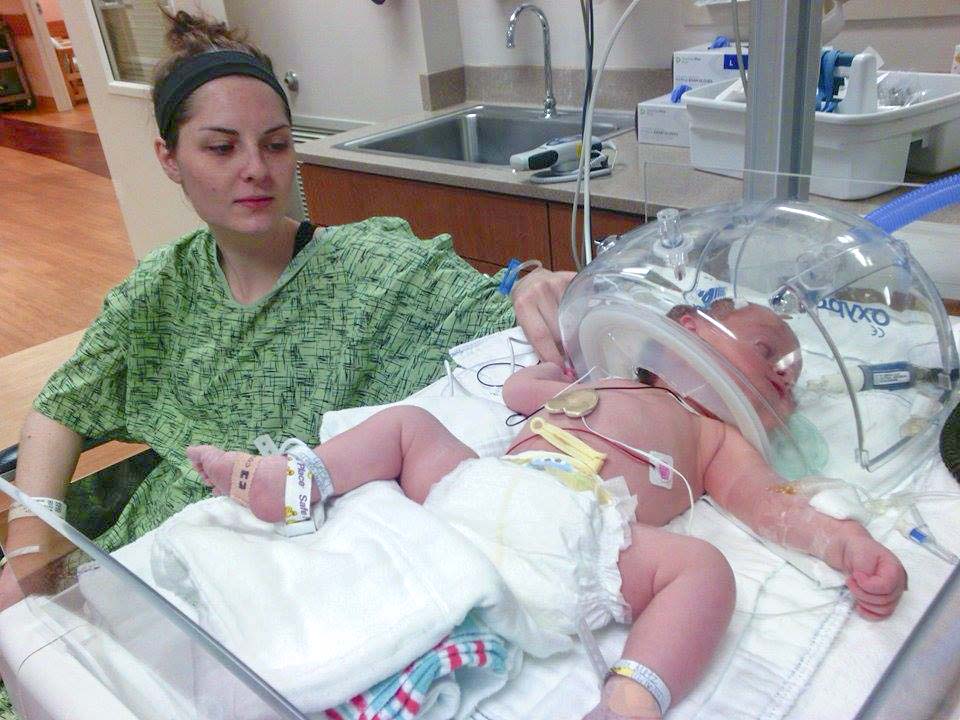
He also had feeding difficulties, due to a weak and uncoordinated sucking reflex. My husband and I found ourselves having to admit Roland to the hospital once more, when he was iv months one-time, for failure to thrive. In other words, his body worked so hard to eat that he was actually burning more calories than he was taking in. We were confused about why our baby had and so much trouble eating when it came naturally (and without a hitch) to others his age.
Our reply came the solar day nosotros were admitted. After settling into our room, a doctor came in to perform a physical assessment on Roland. After a lengthy (and most completely silent) assessment, he said, simply and without hesitation, "Hypotonia."
"What?" I asked.
"Hypotonia," he repeated. "I knew it the moment I saw him."
He went on to explain to my husband and I what this meant (and I can't be sure that he didn't give me the condom band analogy). It was a relief to finally have an reply to the questions in our minds; a diagnosis soothed the growing unsettling feeling in our stomachs and the voice screaming in the back of our minds, something's not right here! Nosotros finally knew the root cause of all of Roland's struggles.
Fast forward to today. Roland is iii years sometime and still has severe hypotonia. Subsequently years of searching, we nonetheless have no definite answers as to the cause of his hypotonia (but most likely it is due to a rare genetic defect). He cannot roll, sit, stand, or walk. He is g-tube dependent, but is growing similar a weed. He can say a few words and loves to babble to whatever and everyone. Despite all of his limitations, he is a happy male child.
Here is what a typical day looks similar for the states:
Morn
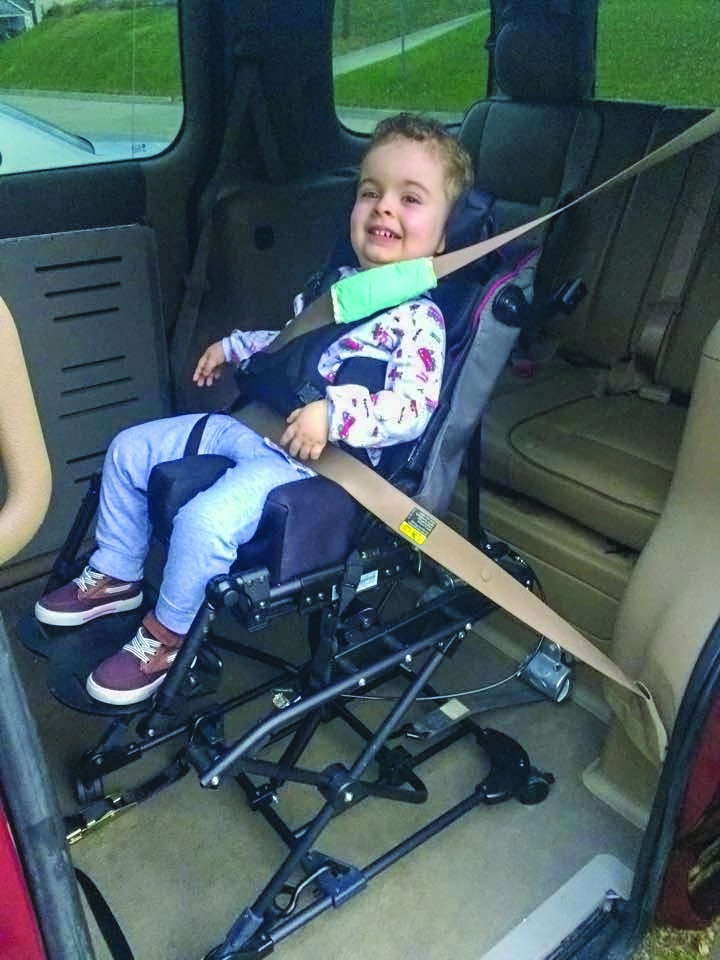
Just like many other kids his age, Roland goes to preschool. I wake him around 7 so that I tin can dress him, feed him his breakfast (via g-tube), and drive the 40 minutes to his preschool. He attends a preschool in a neighboring city, one that was specifically congenital for kids with special needs. He receives occupational, physical, and spoken communication therapy during his 3-hour school day.
Roland loves going to school. He plays right aslope his peers–some "typical" peers and some with limitations, as well, considering his classroom follows an integrated model–and he does whatever his peers are doing, only adapted to meet his abilities. Some of Roland's favorite things to practice at schoolhouse are going exterior, swinging, reading books, and participating in sensory activities (the messier the meliorate!).
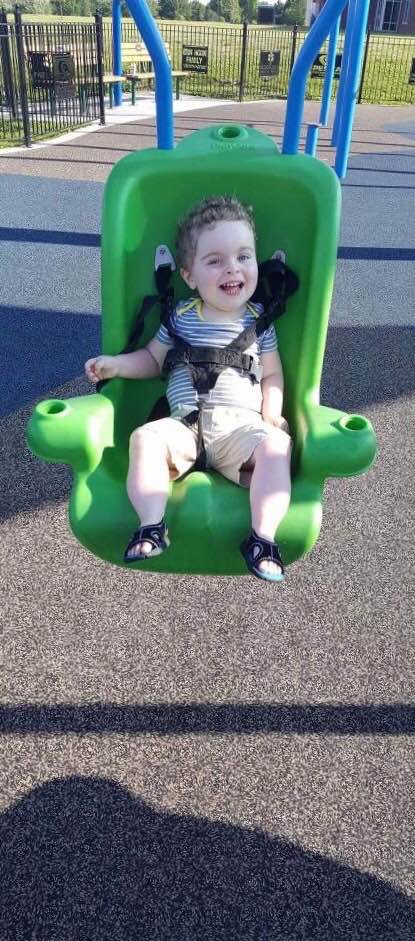
While Roland is at school, I spend this time blogging, scheduling therapies, calling doctors' offices, ordering feeding supplies, getting Roland's equipment repaired, and/or grocery shopping. Some days I hang out with him at preschool and meet with his teachers and therapists to see what progress he'south been making and how he's liking being there.
Afternoon
I option Roland up from school at 11:xxx and feed him again earlier we make the drive domicile. We follow a very enervating feed schedule, with Roland receiving something via g-tube every two hours. Some of his peers will gather around while I feed him, amazed by this procedure. I explain to our audition that Roland has problem swallowing food, and then instead, nosotros put his food right into his tum with a tube. "This is how Roland eats. Pretty absurd, huh?" I say. They will smile and yell "yeah!" Roland smiles back and babbles to them until we are finished and it'south time to become.
Roland about always falls asleep on our ride dwelling. He gets worn out from his therapies and from playing with his peers. For someone with hypotonia, even the smallest tasks can use upward a lot of free energy.
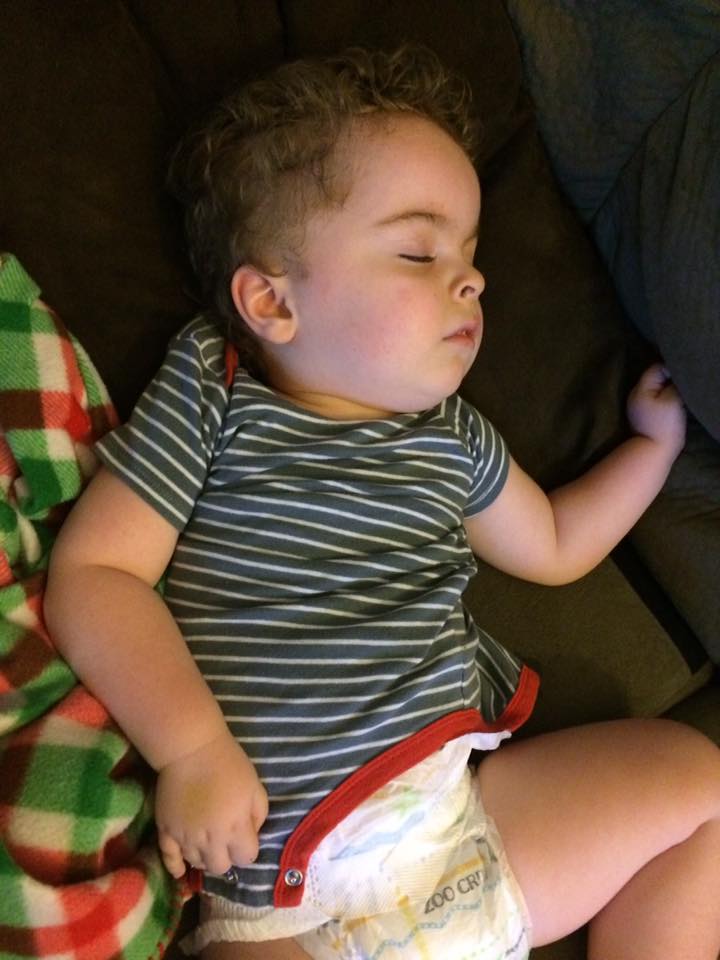
Roland volition continue his nap at dwelling house until information technology's time for more therapy. In improver to the therapies he receives at his schoolhouse, he gets individual therapy at our local infirmary. To avert completely exhausting him, we schedule OT and PT on different days, with a speech overlap on ane of them. Anyone with a hypotonic kid knows how important therapy is; PT and OT strengthen a hypotonic child's muscles, prevents contractures from developing, and helps them gain skills needed to achieve milestones–or inchstones, as we call them in the hypotonia circumvolve. Oft times, it feels similar our life is scheduled around therapy, and not the other way around.
Once therapy is washed and we are back at domicile, the residuum of Roland'due south day is for relaxing and playing (while I effort to grab up on housework and accept care of Roland's petty brother, who stays at home with my married man during the mornings). Playing, for Roland, looks a flake different than other kids his age. Due to his hypotonia, he struggles with the dexterity and movement required for so many of the toys in his age range. Because of this, I've tried to come up upwardly with things inside his abilities that he can enjoy independently. Some of these include: playing elementary games and "reading" books on his tablet, sensory bins, switch-adjusted toys, and easily manipulated toys, like cars. Right now, his favorite toy in the earth is his spin drum, and he absolutely loves watching Curious George (and anything Curious George-related!). He also loves to "scoot" around on his dorsum, all over our living room.
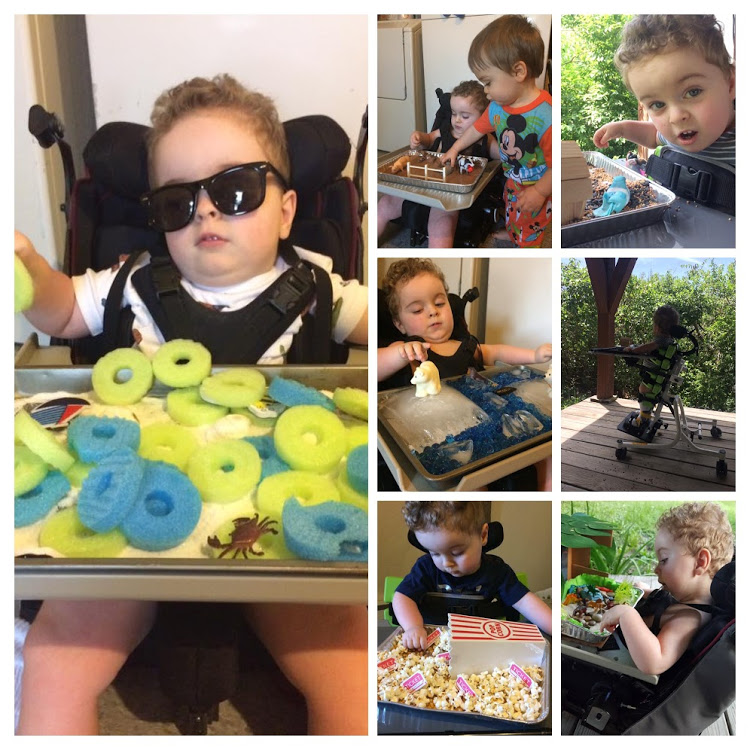
Evening
While making dinner, I ordinarily put on a movie or telly bear witness for Roland and his footling brother or gear up upwards some activity in the kitchen for the both of them to engage in while I cook. If Roland is in the kitchen with me, he will beg me to spin him around in his wheelchair past looking at me with puppy-canis familiaris eyes and repeating "pivot." He loves any kind of motion–the faster, the better.
Afterwards dinner is over, I have Roland choose from a couple books and nosotros read earlier he goes to bed. He particularly likes lift-the-flap books (and they're great exercise for him).
When both kids are asleep, I finally become time to myself. I use this time to make to-do lists for the next day, set upward sensory bins or activities, weblog/write, or another things that I enjoy, similar scrapbooking, Netflix-binging, or reading. It would exist all-too-easy to spend my free time catching upwardly on housework, laundry, or the hundreds of other chores that I always seem to exist backside on. But, as a special-needs mom (and parent in general), I know how crucial self-intendance is, so I always brand time for myself, either at night or some other fourth dimension during the day.
Our life may wait very different from the outside, but we really aren't that dissimilar from other families. Nosotros have our ain unique challenges, simply at the end of the twenty-four hour period, my hubby and I are simply trying to practise the best we tin can to raise two sons, whom we love more than anything in the globe. We desire them to be happy and healthy. Nosotros but accept dissimilar means of achieving this; our son's disability requires nosotros practise things other families don't accept to do. Simply nosotros take adjusted. And nosotros continue to suit in the face of our unique challenges. Just similar every parent does for their child.
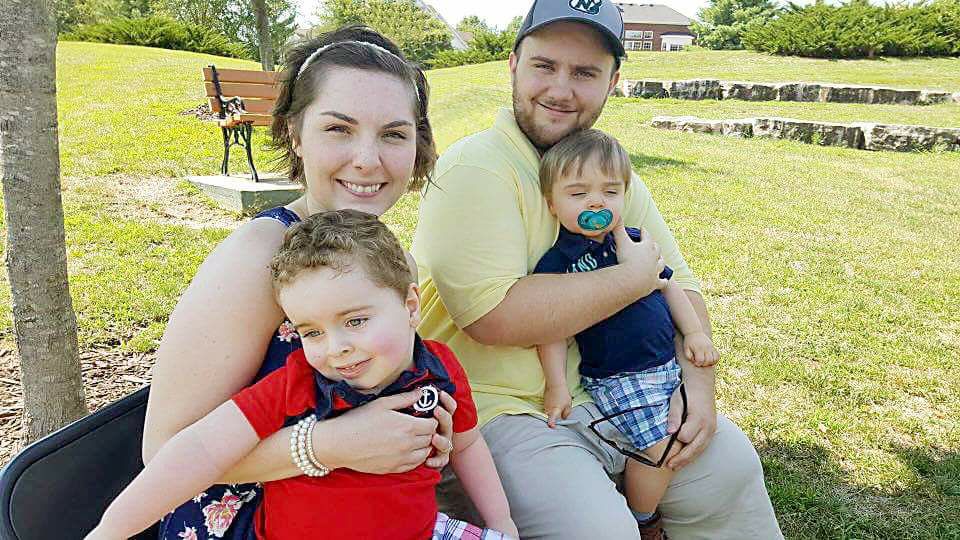
Read more personal stories
Source: https://surestep.net/blog/severe-hypotonia-day-in-life/
Post a Comment for "Do Hypotonic Babies Have Easier Time Rolling at Night"